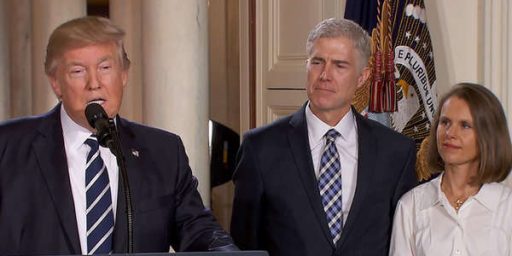Supreme Court Rules No Right to ‘Painless Death’
The replacement of Anthony Kennedy with Brett Kavanaugh is already having a significant impact.

WaPo (“Divided Supreme Court rules against death-row inmate with rare condition“):
The Supreme Court’s stark divide on the issue of capital punishment was on full display Monday, as the conservative majority ruled against a Missouri death-row inmate who said his rare medical condition could mean an agonizing death that would violate constitutional standards against cruel and unusual punishment.
The court ruled 5 to 4 that Russell Bucklew, convicted of murder 22 years ago, failed to show that the state’s use of a lethal injection would make his suffering exceptional and that he had not proved that an alternative would be better.
“The Eighth Amendment has never been understood to guarantee a condemned inmate a painless death,” Justice Neil M. Gorsuch said in announcing the decision from the bench. “That’s a luxury not guaranteed to many people, including most victims of capital crimes.”
On a broader point, the majority declared a renewed skepticism of long-running and last-minute legal efforts to postpone executions and indicated that death-row inmates faced a more substantial barrier in challenging the methods of execution that states employ.
That brought a biting rejoinder from the dissenting liberals, who additionally referred to a decision in February in which the conservatives denied the last-minute stay request of an Alabama inmate who was not allowed to have an imam at his side at his execution.
“It might be possible to end delays by limiting constitutional protections for prisoners on death row,” wrote Justice Stephen G. Breyer. “But to do so would require us to pay too high a constitutional price.”
Bucklew’s execution has been delayed several times, and now-retired Justice Anthony M. Kennedy had joined liberals in the last stay.
But Kennedy has been replaced by Justice Brett M. Kavanaugh, who voted with Gorsuch and the rest of the court’s conservatives to let the execution move forward.
Missouri plans to use an injection of a single drug, pentobarbital, to carry out Bucklew’s execution. But he suffers from a congenital and rare disease called cavernous hemangioma. It causes blood-filled tumors to grow in his head, neck and throat, which his attorneys say could rupture during the state’s lethal injection process.
Breyer said Bucklew had developed persuasive evidence that lethal injection could cause him to “sputter, choke, and suffocate on his own blood for up to several minutes before he dies.”
That would subject him to “constitutionally impermissible suffering,” Breyer wrote. “The majority holds that the state may execute him anyway. In my view, that holding violates the clear command of the Eighth Amendment.”
Mark Joseph Stern is less dispassionate in an analysis for Slate (“The Supreme Court’s Conservatives Just Legalized Torture“):
On Monday, five justices of the Supreme Court authorized Missouri to torture a man to death. In the process, they appear to have overruled decades of Eighth Amendment precedents in a quest to let states impose barbaric punishments, including excruciating executions, on prisoners. The court’s conservative majority has converted a once-fringe view into the law of the land, imperiling dozens of decisions protecting the rights of death row inmates, as well as juvenile offenders. Its ruling signals the end of an Eighth Amendment jurisprudence governed by “civilized standards”—and the beginning of a new, brutal era in American capital punishment.
Russell Bucklew is a death row inmate in Missouri who suffers from a rare medical condition called cavernous hemangioma. Due to this disorder, his body is covered with tumors filled with blood vessels. Tumors in Bucklew’s neck and throat, his lips and uvula, which make it difficult for him to breathe. They are highly sensitive and frequently squirt blood. A medical expert, Dr. Joel Zivot, has testified that if Missouri administers a lethal injection to Bucklew, he will die a slow, agonizing death. His tumors will rupture and fill his mouth with blood, and he will suffocate to death in unbearable pain, choking and convulsing on the gurney as he dies.
To forestall this fate, Bucklew sought to block his execution by lethal injection, arguing that it would violate the Eighth Amendment’s bar against “cruel and unusual punishments.” Under two Supreme Court precedents, Baze v. Rees and Glossip v. Gross, an inmate challenging his method of execution must provide an “available alternative” that will cause less pain.
Bucklew asked to be killed with nitrogen gas so that he can die from “hypoxia,” a lack of oxygen, because his death from hypoxia would be faster than his death from lethal injection.In Monday’s Bucklew v. Precythe, the court rejected his claim by a 5-4 vote. Justice Neil Gorsuch’s opinion for the court, however, does much more than condemn Bucklew to a harrowing demise. It also quietly overrules, or at least erodes, more than 60 years of precedents, including several written by Justice Anthony Kennedy. Gorsuch embraced a vision of the Eighth Amendment supported by Justices Clarence Thomas and Antonin Scalia that has consistently been rejected as dangerously extreme by a majority of the court.
Here is how Gorsuch does it. Baze and Glossip, he writes, declare that if a death row inmate seeks to avoid a certain method of execution, he must identify a different one that can be feasibly administered. That is true. But why does the Eighth Amendment prescribe such a test? In Baze and Glossip, the court explained that “because it is settled that capital punishment is constitutional,” there “must be” a constitutional “means of carrying it out.” “[B]ecause some risk of pain is inherent in any method of execution,” the court has held, “the Constitution does not require the avoidance of all risk of pain.” The court’s duty, then, is simply to ensure that states do not impose a risky method of execution when a less painful method is at their disposal.
Gorsuch is surely right that, since it is twice enshrined in the Constitution, capital punishment itself can’t be deemed cruel and unusual punishment. He’s also right that a “painless death” surely isn’t prescribed and that murder victims certainly don’t enjoy that privilege. Indeed, the description of Bucklew’s crimes in the above-linked WaPo report makes it difficult to feel too sorry for his plight:
In 1996, Bucklew, now 50, stalked his former girlfriend Stephanie Ray at another man’s trailer. He shot and killed the man, Michael Sanders, tried to shoot Ray’s fleeing child and then captured Ray. He handcuffed and raped her, then wounded a police officer in a subsequent gunfight.
Bucklew later escaped from jail and attacked Ray’s mother with a hammer before he was recaptured.
At a visceral level, I don’t mind much if he suffers a bit while he dies.
But, of course, we’re talking about punishment being meted out by the justice system, not an act of revenge against a horrible human being. And the Supreme Court has, over a period of six decades, applied an “evolving standards of decency” lens to understanding the Eighth Amendment.
It would be one thing if Bucklew had been arguing that, because his health condition makes lethal injection too painful, his life should be spared. If those were the two alternatives, I would agree with the majority that the state’s right to execute a heinous criminal trumps the right of the criminal to die a pain-free death. But Bucklew was instead arguing that, since his condition makes lethal injection cruel, the state should instead use another method of execution. Absent evidence from the state that Bucklew’s preferred alternative was unreasonable or impractical, I can think of no reason not to accommodate the request.
Here, from Amy Howe’s summary at SCOTUSBlog, is how Gorsuch justified it:
And in any event, Gorsuch stressed, the requirement of showing an available alternative is not as difficult as Bucklew might suggest, because he is not limited to the methods of execution currently allowed in Missouri, where he was convicted. Instead, Gorsuch observed, he can also “point to a well-established protocol in another State as a potentially viable option.” Therefore, Gorsuch concluded, “we see little likelihood that an inmate facing a serious risk of pain will be unable to identify an available alternative—assuming, of course, that the inmate is more interested in avoiding unnecessary pain than in delaying his execution.”
In this case, Gorsuch outlined, Bucklew had made only a “bare-bones proposal” to use death by nitrogen gas, depriving the body of oxygen, as an alternative to lethal injection. In Gorsuch’s view, that proposal “falls well short” of showing that the alternative could be “readily implemented” because Bucklew had not offered any evidence on what Gorsuch deemed “essential questions”: “how nitrogen gas should be administered (using a gas chamber, a tent, a hood, a mask, or some other delivery device); in what concentration (pure nitrogen or some other mixture of gases); how quickly and for how long it should be introduced; or how the State might ensure the safety of the execution team, including protecting them against the risk of gas leaks.” The state also had a good reason not to switch from lethal injection, Gorsuch pointed out: No state has ever used nitrogen gas to carry out an execution before.
That’s . . . actually quite reasonable. It would be odd, indeed, to order the state to eschew its ordinary method of execution on Eighth Amendment grounds and order it to substitute a vague procedure never previously used to execute a human being. Essentially, they would be running a science experiment on Bucklew.
But if that’s the argument, why not simply order the state to accede to any readily-accessible alternative method that Bucklew comes up with?
Gorsuch and his majority seem unusually fixated on the delaying issue. Again, from Howe’s summary:
The court’s opinion concluded by noting that Bucklew “committed his crimes more than two decades ago,” while his appeals and post-conviction challenges were completed over 10 years ago. “The people of Missouri, the surviving victims of Mr. Bucklew’s crimes, and others like them deserve better,” Gorsuch emphasized. “Under our Constitution,” Gorsuch continued, “the question of capital punishment belongs to the people and their representatives, not the courts, to resolve.” The courts’ role, Gorsuch suggested, is to make sure that challenges to a proposed method of execution “are resolved fairly and expeditiously.” To that end, Gorsuch stressed, last-minute stays “should be the extreme exception.” Citing the recent case of a Muslim death-row inmate who had wanted an imam to be at his side in the execution chamber, but who had “waited to bring an available claim until just 10 days before his scheduled execution for a murder he had committed 24 years” before, Gorsuch explained that the justices might deny requests for relief that could have been filed earlier.
I’m actually sympathetic to that argument. While I think that, as a matter of public policy, we should do away with the death penalty—as many states have—to the extent we’re going to continue using it the society has a real interest in carrying it out without excessive delay. There’s simply no reason to allow endless rounds of appeal by introducing new issues one-by-one.






All the people who, after decades on death row, turn out to be completely innocent surely wouldn’t make us want us to slow down and make sure we’re getting every right.
@Stormy Dragon:
The possibility of error is among the main reasons I have come to oppose capital punishment. But two decades of legal shenanigans is rather much. We’ve long stopped litigating Bucklew’s innocence. Indeed, this was a rare case in which there was eyewitness testimony to the murder and other crimes.
Getting rid of capital punishment would have another benefit: not using up all of the Supreme Court’s time. Honestly, it seems like they’re reviewing appeals all the time.
There’s a reason for that and it goes right back to a statement you made earlier:
That’s *exactly* what it is to those who feel we should rush through the process and bitterly complain about the upkeep of prisoners under the guise of “delayed justice for victims”. They want blood and they want it now – waiting for justice doesn’t diminish it, merely delays it. If your need for “justice” is immediate and cannot wait out the legal process in place , then what you are truly seeking is retaliation. Retaliation requires instant gratification – it cannot survive the slow march of time. When people complain the process takes too long, they are really complaining that they’re not getting their pound of flesh fast enough and it’s no longer about justice but sadism.
What’s more – the fact that the state now has the right to inflict unnecessary pain on it’s own citizens in process of carrying out capital punishment should worry us all. We already had an administration that publicly and officially OK’d torture of enemy combatants – a HUGE deviation from our previous values. Now, we’re saying it’s OK to do it to our own citizens…. as long as they’re been marked for death by the legal system, of course. How long is it going to be before we slip just a little more and suddenly it’s OK in other scenarios?
When society proves it has a 100% track record on convictions…then we can start to think about other efficiencies. In the meantime the risk of wrongful conviction is too great to rush.
I don’t believe in god, but if I did I would ask her to never put me in a position of needing to count on Justice Boof to do the right thing.
@KM: Beautiful post.
Sounds like a slippery slope argument, but you do gotta wonder how many pro-lifers would go along with a painful death for one of those people they call “baby killers”.
@Franklin:
It is somewhat of a slippery slope argument. I freely admit that. But in the space of 3 Presidents we’ve gone from “America doesn’t torture” to “sure, why the hell not ‘Murica! Get them terrorists” and “we accept capital punishment as justice if done humanely” to “the state has the right to inflict agony on you above and beyond what’s necessary to render the sentence”. Hell, we’ve gone from “air strikes with civilians in the area are tools of murder from afar” to “as long as you don’t kill too many civilians, it’s alright” and that was under Presidents far more moral then Trump. The man was talking about machine guns at the border last week. Granted, it’s Trump and it’s his usual thoughtless verbal diarrhea but it’s enough to make you pause and think about what if somebody didn’t stop his ass and let that horror show happen…..
I’m not liking where this logic takes us. More and more, we’re devaluing human life when it comes to government lethality and cruelty. Bit by bit, we’re becoming comfortable with the idea that the government is allowed to inflict brutalities on people as long as they are “Other”. Funny story, though: “Other” is a flexible term and can easily come to include you depending on who’s defining it. Isn’t that why conservatives traditionally distrusted the federal government – that they feared tyranny, oppression and barbarity from above? Now, they’re approving it as long as it’s against people they think deserve it.
Somewhat related:
Should gay men be sentenced to death rather than prison because they would enjoy being in prison with other men?
Barbarism is alive and well in the United States.
Hey, why don’t we just bring back lynching and save all the money we waste on courthouses and legal salaries and stenographers’ little typing machines? After all, if we’re going to be “visceral” about this, let’s go all the way! I was under the impression that we had put all that stuff behind us and finally embraced the rule of law but that’s apparently just another manifestation of our national infatuation with ourselves.
…it seems like they’re reviewing appeals all the time.
I see what you did there…
I’m impressed with Gorsuch’s belief that the prisoner has the burden to find a complete protocol for a humane death, and that the state can simply say “well, the prisoner failed to figure out this detail so we will just shove him feet first into a woodchipper.”
Didn’t he also vote to not let prisoners have the clergy of their choice with them during execution?
Nice guy.
This is such a wasted chance. Had the court ruled executions must be humane and as painless as reasonably possible, they’d have hurried the demise of the death penalty along.
Of course, knowing the GOP these days, perhaps that was what they feared doing.
@Gustopher: Fuck Mitch McConnell. If it weren’t for that reeking pile of human manure, we’d have Justice Garland and America would be a far better place.
What the hell, why not have the condemned man’s execution involve being torn apart by a pack of hungry lions at Busch Stadium, with tickets sold for seats and broadcast live on pay-per-view? Missouri’s budget deficit could be reduced with the money raised from this event…
Gotta’ wonder if the downvoter for The United States Constitution is kin to one of these guys.
Let’s not pretend that Gorsuch’s previous decisions didn’t point in this direction of such a stark and cruel interpretation of the law.
Let’s not forget that he was the one who went on record that taking steps to preserve one’s life in the undisputed face of death was a fire-able offense (even after the company in question helped create the issue at hand):
https://www.theguardian.com/law/2017/mar/23/neil-gorsuch-supreme-court-frozen-trucker-alphonse-maddin
@An Interested Party:
In the past, executions could be quite brutal. Things like impalement, breaking on the wheel, crucifixion, burning at the stake, being torn by wild animals, and even worse were not only common, but sometimes carried out as a spectacle for the enjoyment of the populace.
The guillotine, the firing squad, and even hanging, were developed as more humane alternatives. So were the electric chair, poison gas, and lethal injection.
The notorious Dr. Kevorkian once proposed, if memory serves, to put a condemned criminal under general anesthesia, and carry out the execution simply by removing their organs, which would then be used for transplant.
The last has a ton of problems, namely turning surgeons into executioners, but also making organ “donation” compulsory for some people (and the slippery slope there gets horrifying, see Larry Niven’s early stories for an illustration, especially “Jigsaw Man”).
I keep bringing up air crash investigations, but that’s because it has been very successful at its stated purpose of making flying safer. Under that system, retribution is at the bottom of priorities, or absent altogether. granted the problems are different, but the purpose of a justice system should be to reduce or eliminate crime.
If such be the purpose, it has at best a mixed success rate. And that, IMO, is largely because retribution is the top priority. Certainly it’s necessary, but if some other means reduces or deters crime, is that so terrible?
Indeed…how ignoble that the United States shares the distinction of having the death penalty with places like North Korea, China, Iran, and Saudi Arabia, among other countries with lovely governments…
After years if logical arguments about wrongful convictions, the expense of appeals, and other reasons against the state killing people, I settled a couple of decades ago on my real reason for being against the death penalty. It is just creepy to think that, given the right circumstances, any one of us could be put to death by the stroke of a pen.